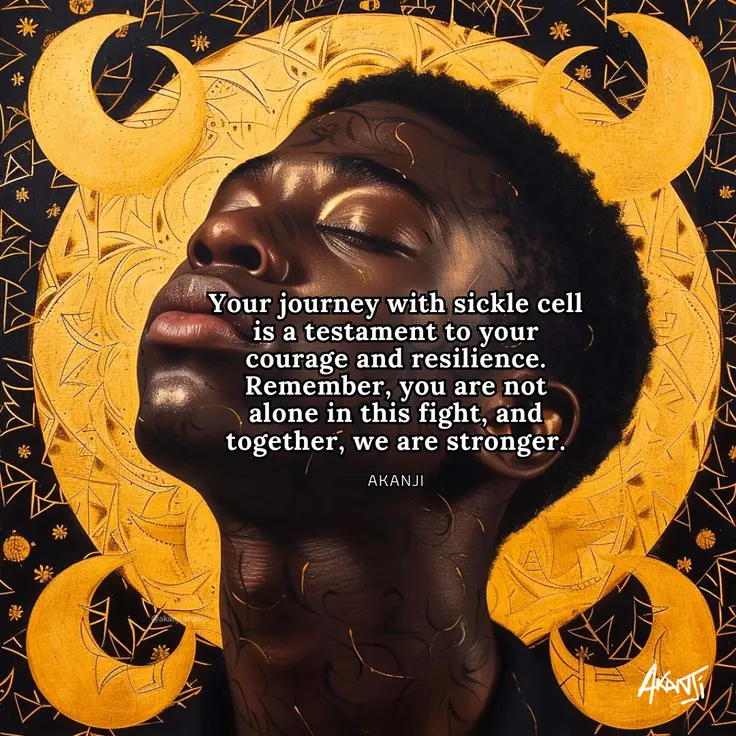Spotlight: Rizzy Akanji - power of resilience & strength
- Maya | HEM Foundation

- Dec 3, 2024
- 4 min read
This month's warrior spotlight is Rizzy Akanji - digital artist, warrior, and advocate
Hemoglobin Genotype: hemoglobin SS (most common and severe form)
Share your personal journey with sickle cell disease and how it has impacted your life.
I was diagnosed with sickle cell disease when I was just 12 months old. I don’t recall the experience myself, but I can imagine how difficult it must have been for my parents to process. I’ve heard stories about people around them making comments like, “Make the most of the time your son’s alive,” which must have been heartbreaking to hear. Yet, amidst the fear, there were family members who held strong faith and believed that my life would one day become a testimony. Their strength and belief have always been a source of inspiration for me.
Growing up, sickle cell disease impacted many aspects of my life. Consistency was a challenge, whether it was attending school, sitting for exams, or even maintaining friendships. Frequent crises often left me isolated indoors or in the hospital. Many people around me were either ignorant or lacked understanding, which made it even harder to explain what I was going through. This lack of awareness sometimes created barriers in communication with friends, family, and my wider network.
One of the most difficult aspects has been dealing with chronic pain. The intensity of the pain not only affects my mobility but also takes a toll on my mental health. Chronic pain can lead to feelings of irritability and sensitivity, making it harder to manage emotions during those tough moments.
Living with sickle cell has taught me that when I feel discomfort within, it often manifests as discomfort in how I interact with the world outside. Pain and isolation can make me feel irritable, but understanding this has helped me approach my emotions with more awareness and patience.
Through this journey, I’ve also learned the power of mindset. By being open-minded to treatments, procedures, and medication, I’ve realised I can play an active role in managing my experience of sickle cell. While the disease presents challenges, I’ve discovered ways to navigate them, and this has shaped me into a more resilient and resourceful person. Ultimately, I’ve come to see my life as a balance of challenges and growth. Despite moments of isolation and misunderstanding, I’ve learned to adapt and find strength in my story, and I hope to inspire others to see that living with sickle cell doesn’t mean giving up on living a full and meaningful life.
What are some common misconceptions about sickle cell disease that you would like to debunk?
A common misconception is that sickle cell only affects Black people. While more common in people of African descent, it also impacts individuals from Middle Eastern, Mediterranean, South Asian, and Hispanic backgrounds due to its link to regions with a history of malaria.
Another myth is that it’s just about occasional pain, but it’s a chronic condition with serious complications, like organ damage and stroke.
How do you manage the symptoms and challenges associated with SCD in your daily life?
To manage my pain, I’ve developed a range of techniques that work for me. These include breath-work, meditation, and using THC and CBD for relief, alongside more traditional approaches like paracetamol, hot water bottles, and massages. I’ve found that applying hot water to sore areas can provide some immediate comfort. It’s all about finding the right combination of methods that align with my body and mind.
Describe a particularly difficult moment you've faced because of SCD and how you overcame it.
One of the hardest moments I’ve faced with sickle cell disease was feeling unsupported & misunderstood by everyone in my life. The isolation and lack of understanding were overwhelming, making it hard to feel truly seen or heard. I overcame this by finding my tribe—connecting with others who shared similar experiences and truly understood what I was going through. Their support inspired me to communicate more openly about my condition, helping people in my life better understand what I face. This shift not only brought me closer to others but also gave me strength and confidence in my journey.
What are some ways you advocate for yourself and others in the sickle cell community?
I advocate for myself and the sickle cell community through art and poetry, which I use as a platform to raise awareness. By organising exhibitions and participating in public speaking engagements, I aim to educate people about the lived experience of sickle cell disease, the importance of blood donations, and the specific challenges faced by those living with the condition. Additionally, I collaborate with healthcare organisations and other partners to host blood donation sign up events, leveraging these occasions to engage directly with the community and encourage actions that support those affected by sickle cell.
Lastly, what is one important lesson or insight that living with sickle cell disease has taught you?
Living with sickle cell disease has taught me the power of resilience and the strength of the human spirit. I’ve learned that challenges don’t define me—they shape me. By embracing my journey and staying open to growth, I’ve discovered that I’m capable of enduring pain, navigating isolation, and still finding ways to thrive. This resilience has shown me that strength isn’t just physical; it’s mental and emotional, and it grows with every challenge I overcome.



















Comments